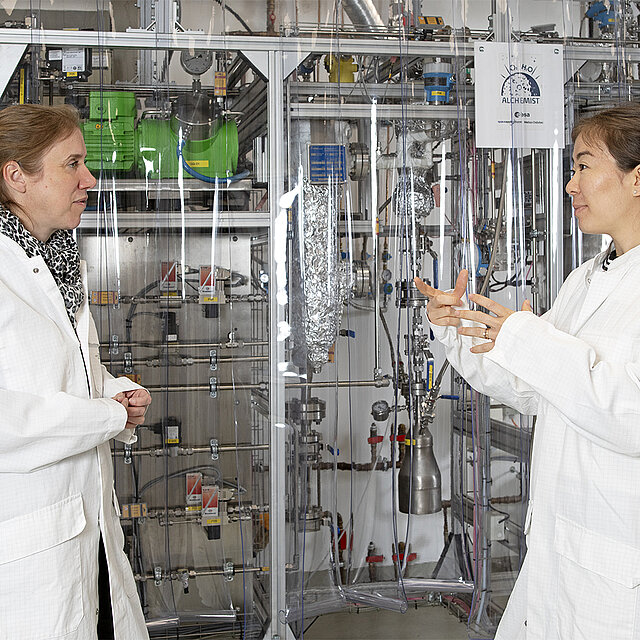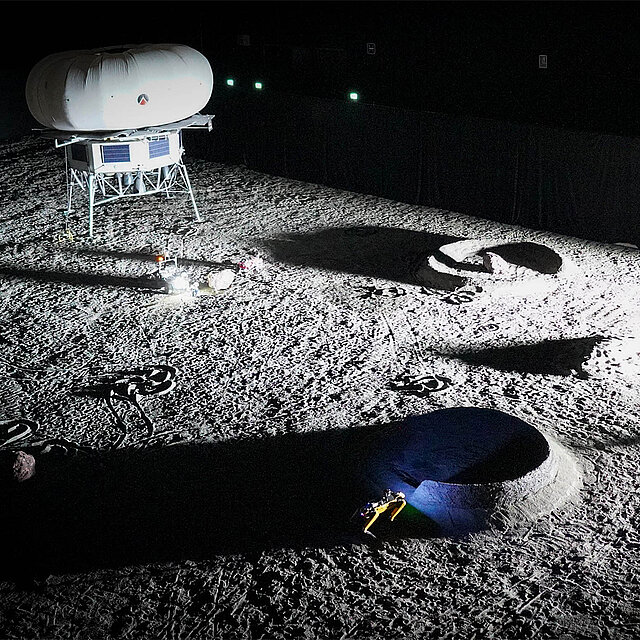Our research
 Space
Space
12. Accelerating the use of space resources
Success Story #1
Accelerating research activities in the field of space
Research work in the field of space grew considerably at LIST in 2022. Several projects have been launched, notably in the form of a partnership with well-known companies such as Airbus and AirLiquide and the Luxembourg start-up MaanaElectric. Backed by a PEARL Chair from the National Research Fund (FNR), with a budget of EUR 3.7 million over five years, Kathryn Hadler took charge of the European Space Resources Innovation Centre (ESRIC), the world's first innovation centre dedicated entirely to space resources. This internationally renowned scientist in the field of mineral processing and beneficiation is now in charge of the centre's development, supported by a research group focusing on the sustainable and responsible use of space resources.
LIST received a demonstration device from the European Space Agency (ESA), called Alchemist. This enables researchers to understand and improve the process of producing oxygen from lunar soil. It will be joined by other demonstrators and research infrastructures in 2023.
Contact: Kathryn Hadler

Success Story #2
Incubating companies specialising in space resources through the ESRIC programme
Within LIST, one of the main activities of the European Space Resources Innovation Centre (ESRIC) is to support the emerging commercial sector in the field of space resources. In 2022, the world's first business incubation programme completely dedicated to space resources was launched. The start-up support programme, resulting from a collaboration between ESRIC, Technoport and the European Space Agency (ESA), incubated the first five start-ups selected in the first half of 2022 following an open call for applications. After three months of preparation, one start-up was selected for two additional years of incubation. This is the Polish company Four Point. The company will establish a branch in Luxembourg at the start of 2023 and is currently based at Technoport. It will benefit from additional technical and commercial support and funding of up to EUR 200,000 for its activities.
In addition to this first selection, the programme has greatly benefited the ecosystem itself, leading to the creation of partnerships between the five start-ups.
Contact: Kathryn Hadler

Success Story #3
Getting to the moon with the first ESA-ESRIC Space Resources Challenge
Space resources are a key element in further space exploration. Identifying resources of interest, such as water, is also an essential part of the journey. In collaboration with our colleagues from the European Space Agency (ESA), we developed the first ESA-ESRIC Space Resources Challenge. This competition, which aims to drive innovation, was open to teams from all ESA Member States with the prize of a contract to develop the presented technology.
A first round of the competition was held in the Netherlands in 2021 and was used to select five teams for the final held at Rockhal in September 2022. For this occasion, Rockhal was transformed into a temporary lunar surface, with "lunar" dust, craters and a landing craft. The five teams competed throughout the week to map an area of the "Moon". On the last day, the site was opened to industry, guests and schoolchildren who had participated in a prize draw. At the end of the challenge, the winning team signed a partnership agreement with ESA and is now continuing to develop its technology related to the moon.
Contact: Kathryn Hadler

Success Story #4
A growing team - diversity and gender balance
Established in 2020, the team at the European Space Resources Innovation Centre (ESRIC) continued to grow in 2022. In April, the new Director, Kathryn Hadler, took up her post and was soon joined by several other colleagues. Currently made up of 16 people, ESRIC is proud to include experts from all over the world, bringing together knowledge and skills from the United Kingdom, Germany, Spain, France, Croatia, Italy, Romania, Mexico, Canada, Kazakhstan, India and Luxembourg. In addition to this cultural diversity, ESRIC has achieved a gender balance between men and women of 44%.
Contact:Kathryn Hadler

- Success Story #1
- Success Story #2
- Success Story #3
- Success Story #4

